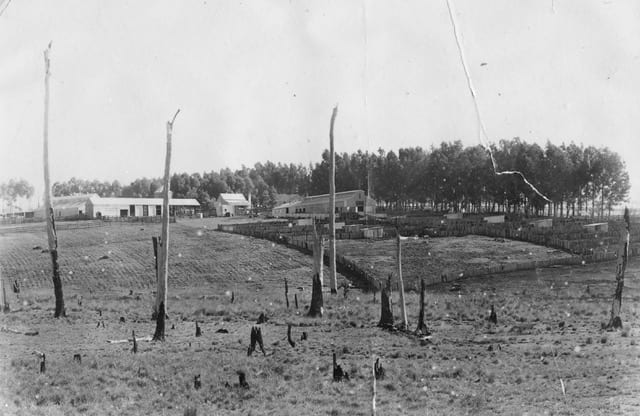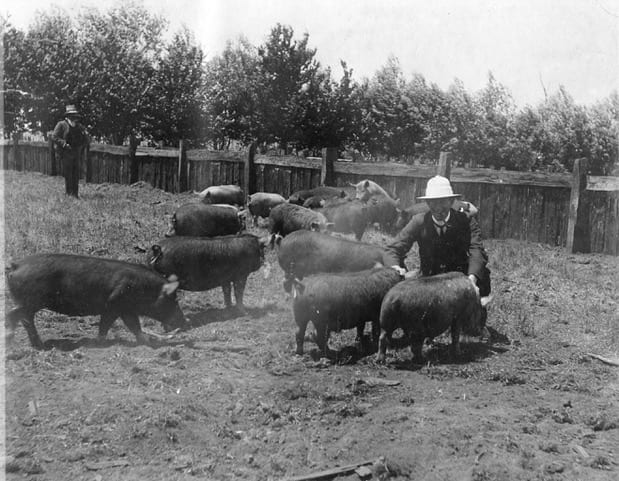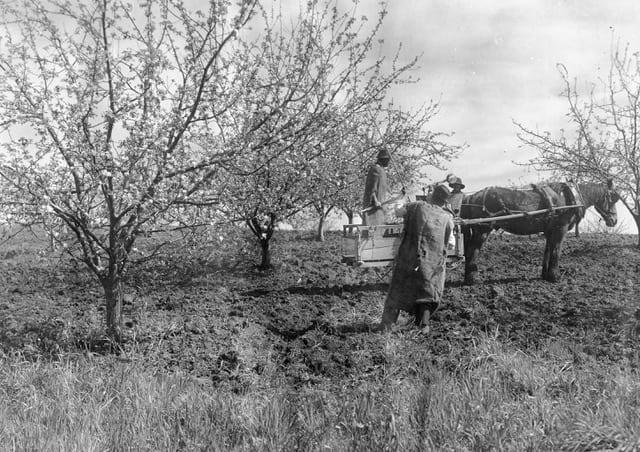
A German Solution to an Australian Problem? 1890s Unemployment and the Leongatha Labour Colony
After Volkhard Wehner was awarded a PhD in 2017 for his thesis on the history of Victoria’s German-speaking community (1850–1930) he soon realised that after completing that milestone, life does not suddenly end. Rather, it opens up countless new possibilities. After reflecting on the transition from the pressures and intensity of the PhD experience, he discusses one of several of his new research projects – late nineteenth-century workers’ colonies.
You’ve finished your PhD. The pressure is off. Or is it? You see, a car doesn’t suddenly come to a full stop from 120 km an hour, and likewise, neither does a postgraduate student’s life, after several years of intensive work. You slow down gradually – at least that was my experience. Some momentum remains but you don’t stop altogether. Privileged as I was as a retired ‘gentleman of leisure’, and without the pressure of having to prepare lectures or to comply with the demands and deadlines that characterise an academic’s life, I began to look for new challenges. I reflected on the various interesting ideas and themes that my doctoral research on Victoria’s German-speaking community had thrown up, but which time hadn’t allowed me to pursue. There were quite a few to choose from. Now was my chance. I took up a couple of these ideas, did some further reading, and decided that they seemed worth to pursue. Perhaps one or another might even be acceptable for publication; one is currently under consideration by a journal. As I got going I was lucky because, once more, the enthusiasm and hunting instinct that had propelled me during the tenure of my PhD returned.

My latest research project happens to be both huge and extremely complex. I propose to briefly survey the nexus between some of the social policies inaugurated by German chancellor Bismarck and an experimental scheme of workers’ colonies established in Germany by the conservative Lutheran pastor-politician Friedrich von Bodelschwingh (1831–1910). Bodelschwingh believed that charity – the act of merely giving – achieved very little. Instead, unemployed and often homeless colonists were offered regular work in commune-like rural colonies that encouraged self-confidence, cooperation, and pride in their work. The appeal of these colonies took off like wildfire; within a decade, over fifteen had been established all over northern and western Germany, and more followed.

Melbourne’s Lutheran pastor Hermann Herlitz, who for many years served as the head of the Lutheran Synod of Victoria, in 1887 inaugurated a mission service to German and other recent immigrants that highlighted the plight many of them experienced in finding work. The numerous contacts Herlitz established in connection with this programme drew his attention to Bodelschwingh’s scheme. Very likely he even corresponded about this with his German colleague. He was enthusiastic about the German programme and, at a conference on charity held at the University of Melbourne in 1890, he proposed to Victoria’s leading thinkers on welfare to implement a similar scheme to deal with the dramatic rise of unemployment and poverty that followed the collapse of Victoria’s economy. With some modifications, in 1893 Herlitz’s proposal was adopted and it resulted in establishing a workers’ colony at Leongatha in south Gippsland. Victoria’s Paterson government had granted an 800-acre allotment to a committee that included Herlitz, with the proviso that ‘approved’ applicants were to be employed at nominal wages for various agricultural pursuits. This workers’ colony operated until 1919, over time giving work to a total of over 9,000 men.

Apart from providing a brief overview of the social developments in Germany and of Bodelschwingh’s workers’ colonies, my investigation proposes to examine why Herlitz succeeded in persuading Melbourne’s social planners to adopt the idea, how the Leongatha colony developed, and how this venture compares with other contemporary cooperative and village settlement schemes established elsewhere in Victoria. In particular, I will make a brief comparison between the Leongatha colony, the shortlived ‘Tucker’ village scheme, and a pseudo-communist settlement established by the German pastor Friedrich Krumnow near Penshurst in western Victoria. I will merely mention the so-called village settlements that were established between the late 1880s and 1900, and the soldier settlements established after World War I; my reason being that these schemes were aimed at owner-settlers, while Leongatha was solely focused on providing work and rudimentary agricultural training, not land ownership.

What this early stage of my research already shows is that the evolution of social welfare – originally seen simply as ‘charity’ has evolved significantly over the past one and a half centuries. It also shows a plethora of early approaches that attempted to deal with poverty and social disruption: utopian, Christian, socialist, as well as rigid, sometimes almost dictatorial, ideas can be found in the literature. A minority view that poverty was self-inflicted, the result of lack of self-discipline or even the loss of Christian belief, remained just that. The view that urbanisation was the cause of poverty, and that society could only be healed by re-establishing a close connection with the land, was more enduring.
Even at this early stage of my research it has become clear to me that, even one and a half centuries ago, society realised the need to devise effective means to deal with poverty and social disconnection, and that pragmatism and a hard-headed practical approach was needed rather than sympathy, generosity or charity, or worse, coercive measures. Alas, none of the various attempts in Australia to deal with this problem appear to have been successful for more than a few years. Leongatha, the only labour colony ever established in Australia, survived for a remarkable twenty-five years. In contrast, several of Bodelschwingh’s institutions, including workers’ farms, hospitals and hostels for the unemployed, are still continuing today.
After completing the early part of the PhD programme, Volkhard felt greatly encouraged when in 2015 he won the 2014 Rodney Lloyd Benjamin History Prize, awarded for the best essay in Australian history by a student enrolled in a postgraduate degree in the Faculty of Arts. After completion of his work and after his thesis had been accepted, in 2018 Lit Verlag in Berlin published his PhD thesis in book form as The German-speaking Community of Victoria between 1850 and 1930. Some details can be found on his website.
Volkhard retains his connection with SHAPS as an Honorary Associate.
